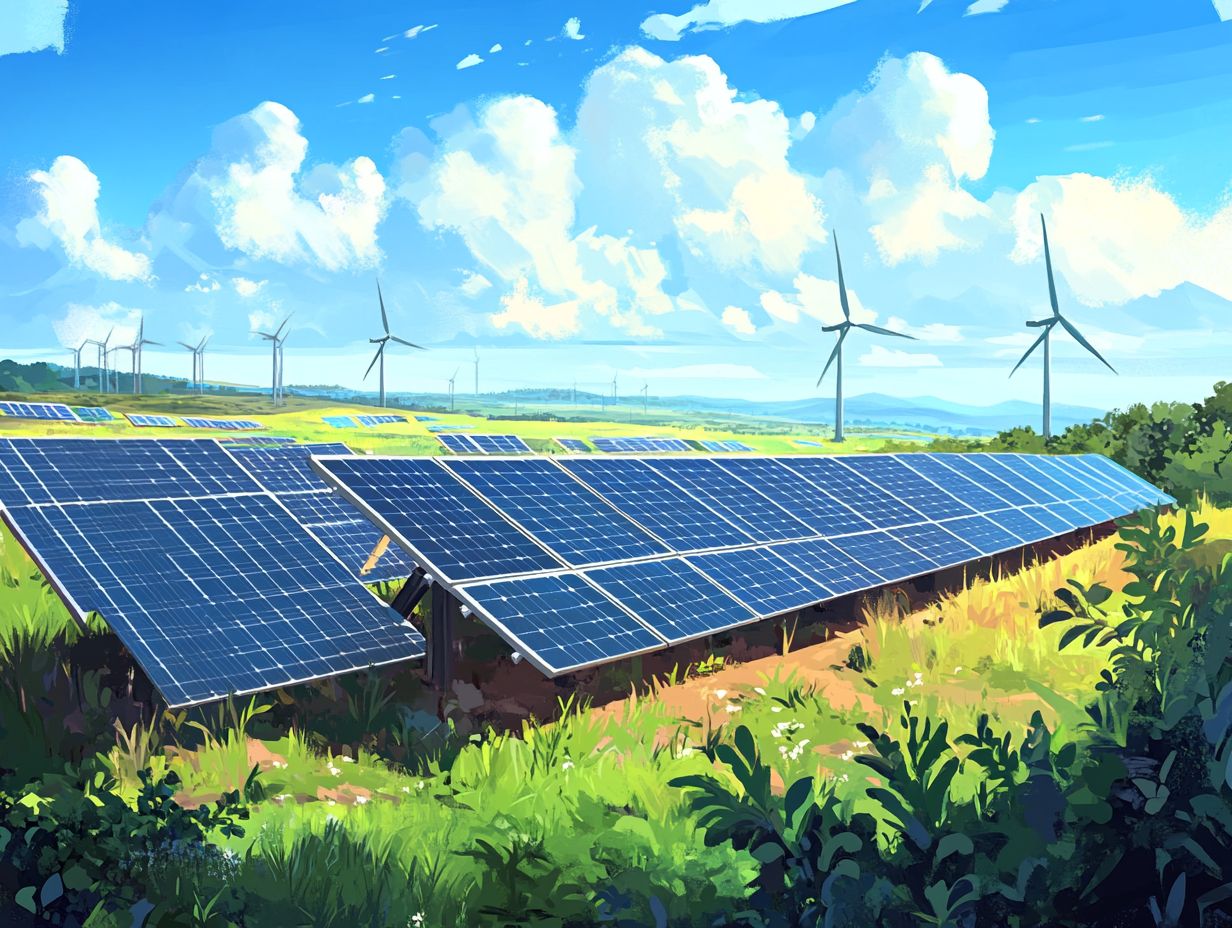Contents
- 1 Understanding Solar Energy
- 2 The Importance of Solar Energy for the Planet
- 3 Comparing Solar Energy and Fossil Fuels
- 4 Ways to Incorporate Solar Energy into Your Life
- 5 The Promising Future of Solar Energy Technology
- 6 Frequently Asked Questions
- 6.1 Why is solar energy important for our planet?
- 6.2 How does solar energy impact the environment?
- 6.3 Why should we use solar energy to power our homes?
- 6.4 What are the benefits of using solar energy for our planet?
- 6.5 Can solar energy be used globally in all parts of the world?
- 6.6 How Individuals Can Make a Difference with Solar Energy
Solar energy is rapidly becoming a beacon of hope in your quest for sustainable living.
As you face the pressing challenges of climate change and environmental degradation, understanding solar energy is crucial. This article dives into what solar energy is all about, highlighting its significant environmental benefits and economic advantages, such as emissions reduction and comparing it to fossil fuels.
You’ll also find practical ways to incorporate solar energy into your daily life and take a peek at the advancements that are shaping its future. So, get ready to explore the world of renewable energy!
Understanding Solar Energy

Understanding solar energy means diving into how this renewable resource taps into sunlight to generate clean energy, which is essential for both you and the planet.
Thanks to advancements in solar technology, solar panels and photovoltaic cells are now more efficient than ever, making solar energy a real contender against fossil fuels in terms of energy efficiency and sustainability.
Once you get the hang of the basics of solar energy, you’ll start to appreciate its importance in energy production, sustainability, and the fight against climate change and global warming.
This knowledge gives you the power to make informed choices about your energy consumption, energy alternatives, and explore options that can help you achieve energy independence and support ecological sustainability and resource conservation.
What is Solar Energy?
Solar energy is all about tapping into the sun’s radiation and turning it into electricity or heat with solar power systems like solar panels, utilizing clean technologies for renewable energy. This clean technology doesn’t just soak up sunlight; it also serves as a sustainable alternative to the old-school energy sources you might be familiar with.
You can capture solar energy using two main technologies: solar thermal systems and solar photovoltaic (PV) systems.
Solar thermal systems work by using collectors to grab that sunlight and convert it into heat for things like water heating and space heating. On the other hand, solar PV systems take sunlight and transform it directly into electricity using semiconductor materials that create a flow of energy.
The ecological perks of these technologies are huge, contributing to environmental sustainability! By cutting down on fossil fuel use, they help lower greenhouse gas emissions, reduce the carbon footprint, and tackle climate change. Plus, harnessing solar energy means cleaner air since it reduces pollution, making it a key player in global efforts to create a healthier environment.
As countries push for more sustainable practices, solar energy is becoming even more important for hitting those big climate action goals.
Luque, A., & Hegedus, S. (2011). Handbook of photovoltaic science and engineering. John Wiley & Sons. Link
The Importance of Solar Energy for the Planet
The importance of solar energy for the planet cannot be underestimated. It plays a crucial role in promoting sustainability and cutting down the environmental impact of how we consume energy, contributing to environmental stewardship.
By making the switch to renewable energy sources like solar, you can really help lower greenhouse gas emissions and fight climate change. Plus, you’ll be contributing to energy security and sustainable development for future generations, which is something we can all get behind.
Environmental Benefits
The environmental benefits of solar energy are pretty impressive. It offers a pathway to a carbon-neutral future while significantly cutting down on pollution and greenhouse gas emissions. By using solar power systems, you can shrink your ecological footprint and help conserve biodiversity.
Solar energy is a key player in the fight against climate change, drastically reducing the carbon footprint linked to traditional fossil fuels, enhancing climate resilience. Take large-scale solar farms, for instance—like the Ivanpah Solar Electric Generating System in California. They’ve managed to produce electricity while also protecting local habitats and wildlife.
Community solar projects are another great way for neighborhoods to band together, harness solar power, and promote community engagement. This makes renewable energy accessible to those who might not be able to install individual systems.
These projects not only reduce reliance on fossil fuels but also boost local job growth and raise environmental awareness among residents. It’s all about creating sustainable communities that are committed to preserving our planet.
Economic Advantages

You’re probably noticing that the economic benefits of solar energy are increasingly recognized, especially as energy costs rise and the push for renewable sources gains momentum. Investing in solar energy isn’t just a trendy choice; it can actually cut down your long-term expenses and help you save big through various solar incentives and government programs.
For homeowners and business owners aiming to reduce utility costs, the return on investment from solar energy becomes increasingly clear. Over time, you can recoup that initial investment through lower utility bills and a bunch of tax credits available at both the state and federal levels.
Plus, the solar industry is a job-creating machine, offering opportunities in everything from manufacturing to installation and maintenance. This not only helps you but also boosts local economies.
And let’s not forget, beyond the financial perks, the shift toward clean energy is backed by government initiatives encouraging communities to make the switch to solar power. This solidifies solar’s reputation as a smart financial and environmentally friendly choice for the future.
Comparing Solar Energy and Fossil Fuels
When you compare solar energy with fossil fuels, it’s pretty clear that solar has a much smaller environmental footprint, particularly in terms of carbon emissions and pollution.
As society moves toward an energy transition, the benefits of solar energy—like its sustainability and efficiency—really emphasize the need for a shift away from fossil fuels as our main energy sources.
Environmental Impact Comparison
The environmental impact of solar energy is way lower than that of fossil fuels. When you use solar energy systems, you’re producing minimal pollution, reducing emissions, and helping to build climate resilience.
On the flip side, burning fossil fuels is one of the biggest culprits behind greenhouse gas emissions, which drive climate change and mess with the ecological balance.
Recent studies show that the average coal-fired power plant emits about 2,200 pounds of CO2 per megawatt-hour. Meanwhile, solar power generates electricity with virtually zero emissions while it’s running. Plus, extracting fossil fuels can really wreak havoc on habitats, contaminate water sources, degrade soil, and disrupt ecological restoration efforts.
The growing interest in renewable energy initiatives, such as government incentives and community solar projects, is driving more people to switch to solar.
This shift not only helps reduce carbon footprints but also supports biodiversity. Solar installations can take up less land than traditional energy sources, all while encouraging sustainable land management practices. It’s a win-win for you and the planet!
Cost Comparison of Solar Energy and Fossil Fuels
A comparison of energy production costs reveals that solar energy costs have been decreasing significantly. This trend makes solar a more economically viable option for you and many other households and businesses, fostering responsible consumption and energy diversification. It’s a great chance to invest in a more sustainable way of producing energy, supporting energy transition and energy transformation.
As technology keeps advancing and production methods improve, the installation and maintenance costs for solar panels and photovoltaic cells have been going down, making them even more appealing as part of sustainable energy solutions. When you think about the ongoing expenses tied to fossil fuels—like those pesky fluctuating prices and environmental regulations—the long-term savings you can see with solar energy really stand out.
Whether you’re a homeowner or a business owner, you’re likely starting to notice the financial incentives out there, like tax credits, solar incentives, and rebates, that can significantly reduce your initial investment costs.
These trends indicate a significant shift in energy sourcing and present an opportunity for communities to engage in a more stable and eco-friendly energy market.
Ways to Incorporate Solar Energy into Your Life

Incorporating solar energy into your life is straightforward and can begin with small, manageable steps. You might consider installing residential solar panels at home or exploring commercial solar options for your business.
Making this switch doesn’t just help you become more energy independent; it also boosts your energy efficiency, supports energy justice, and can lower your energy costs over time.
Options for Residential and Commercial Use
Both residential and commercial solar power systems come with their own set of perks, from slashing your energy bills to boosting your property value. Whether you’re interested in off-grid solar or community solar projects, there are flexible options out there for anyone looking to harness the power of the sun.
If you’re thinking about going solar, you can pick between on-grid systems, which tap into the existing utility grid for net metering, or off-grid systems that grant you complete energy independence.
On-grid solutions are often more budget-friendly since you can sell any excess power back to the grid. On the other hand, off-grid systems are perfect for those remote spots where staying connected is a challenge.
Community solar projects offer a fantastic alternative for those who can’t install panels on their own property, advancing decentralized energy systems and energy access. These projects let individuals and businesses join in on the solar energy action and enjoy the savings, contributing to public awareness, while promoting sustainability and energy equity within the community.
U.S. Department of Energy (DOE). (2020). A Guide to Community Solar: Utility, Private, and Non-profit Project Development. Link
The Promising Future of Solar Energy Technology
The future of solar energy looks bright for you, driven by ongoing advancements in solar technology, energy innovation, and a growing commitment to sustainable energy solutions, supporting international cooperation and climate policy.
As you navigate this global energy transition, adopting solar power could be key in tackling climate change and cutting down on fossil fuel dependence, while promoting energy independence and sustainable development.
Recent Advancements in Solar Technology and Their Impact
Recent advancements in solar technology, including photovoltaic cells and solar incentives, have really transformed the game, boosting energy efficiency and storage capabilities that are crucial for making the most of solar energy’s potential. These innovations get a nice boost from renewable energy initiatives and supportive solar policies, contributing to emissions reduction and environmental sustainability.
For example, the latest solar panel designs now convert way more sunlight into electricity using clean energy technology, so you can harness energy more effectively than ever before, whether you’re a homeowner or a business. Plus, advancements in energy storage solutions, like batteries, allow you to capture all that extra energy generated during peak sunlight hours, enhancing energy resilience and energy security. This means you can enjoy a reliable power supply even when the sun decides to take a break.
Solar heating systems, a form of solar thermal technology, have also stepped up their game, offering improved heating efficiency for both residential and commercial buildings, which helps reduce reliance on fossil fuels and promotes ecological impact.
As these technologies keep evolving, their impact on future energy consumption becomes even more important, potentially reshaping energy policies to put sustainable and renewable resources in the spotlight, encouraging responsible consumption and environmental protection.
Frequently Asked Questions

Why is solar energy important for our planet?
Solar energy is important for our planet because it is a renewable and sustainable source of energy that does not produce harmful emissions or contribute to climate change. It also helps reduce our dependence on non-renewable energy sources like fossil fuels, which are limited and harmful to the environment, fostering a sustainable future and promoting environmental stewardship.
How does solar energy impact the environment?
Solar energy has a positive impact on the environment as it does not produce greenhouse gases, air pollutants, or water pollutants. It also helps reduce our carbon footprint, contributing to pollution reduction and slowing down the effects of global warming and climate change, promoting climate resilience.
Why should we use solar energy to power our homes?
Solar energy is a clean and renewable source of energy that can significantly reduce your home’s electricity bill, contributing to energy cost savings. It also increases your home’s value and helps reduce your carbon footprint, making a positive impact on the environment and fostering environmental awareness.
What are the benefits of using solar energy for our planet?
There are many benefits of using solar energy for our planet, including reducing air pollution and conserving natural resources, while promoting biodiversity and ecological restoration. Solar energy also helps create green jobs and stimulate economic growth in the renewable energy industry, fostering energy innovation and sustainable practices.
- Reduces air pollution
- Conserves natural resources
- Promotes biodiversity and ecological restoration
- Creates green jobs
- Stimulates economic growth in the renewable energy industry
Can solar energy be used globally in all parts of the world?
Yes, solar energy can be used in all parts of the world. While some areas may receive more sunlight than others, advancements in solar technology have made it possible to generate energy even in cloudy or colder regions through decentralized energy systems and community solar projects. Solar energy is a versatile and accessible source of power that can be used globally, promoting energy access and international cooperation.
How Individuals Can Make a Difference with Solar Energy
By using solar energy, individuals can make a significant impact on the environment by reducing their carbon footprint and helping to slow down the effects of climate change, fostering a path towards carbon neutrality. They can also save money on their energy bills and contribute to the growth of the renewable energy industry and energy diversification. It’s a small step that can make a big difference for our planet, encouraging energy literacy and public awareness through targeted campaigns.







